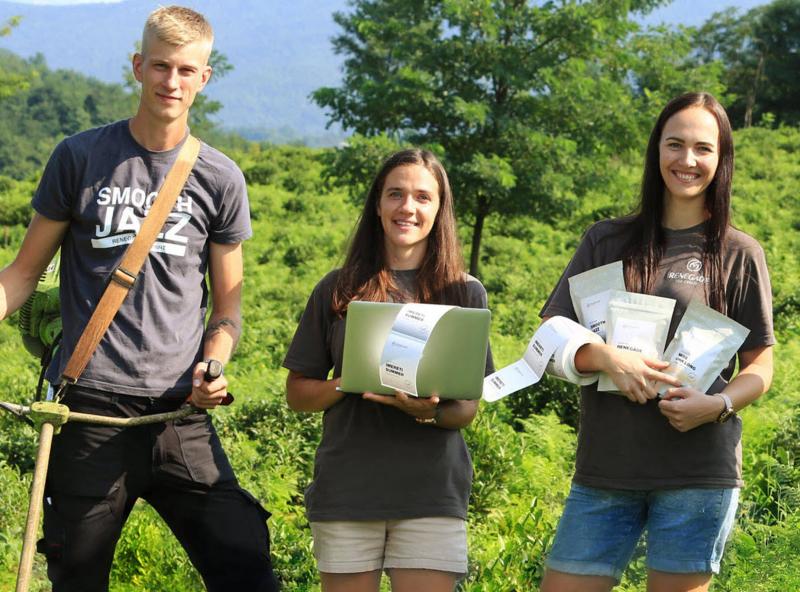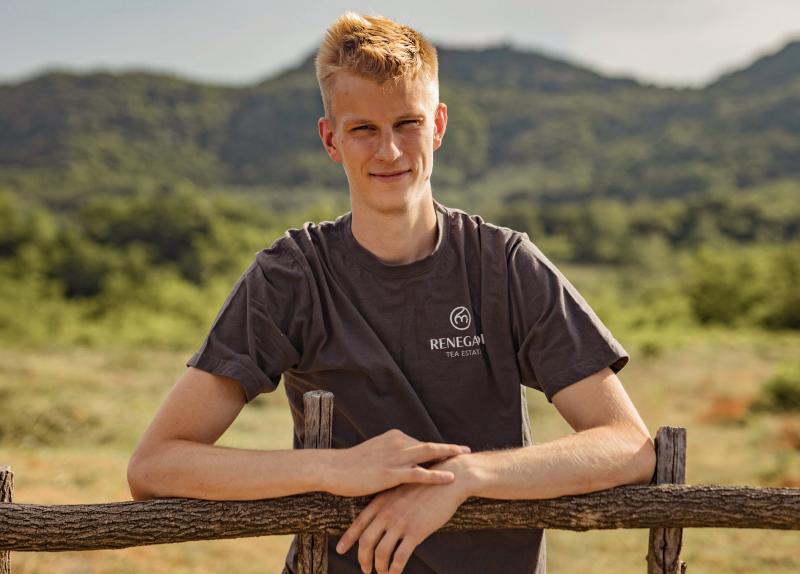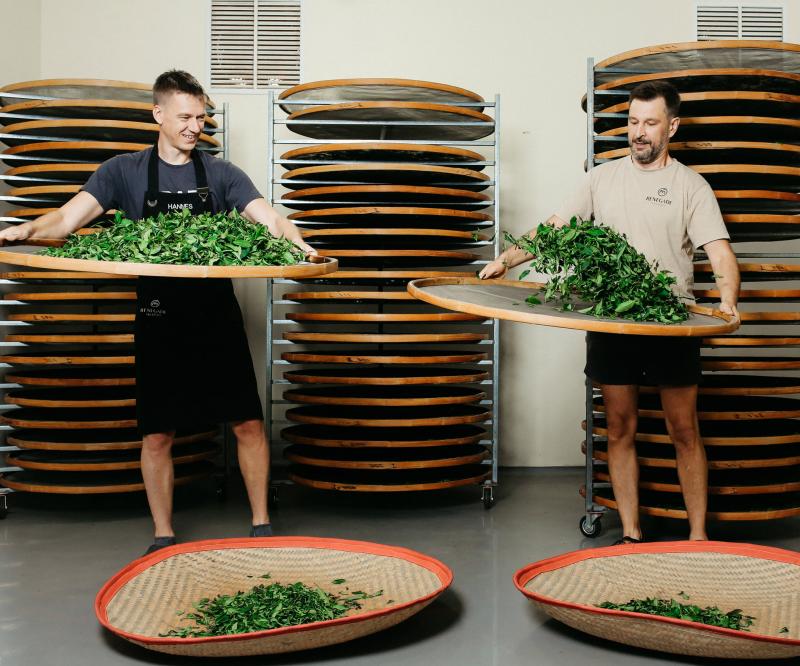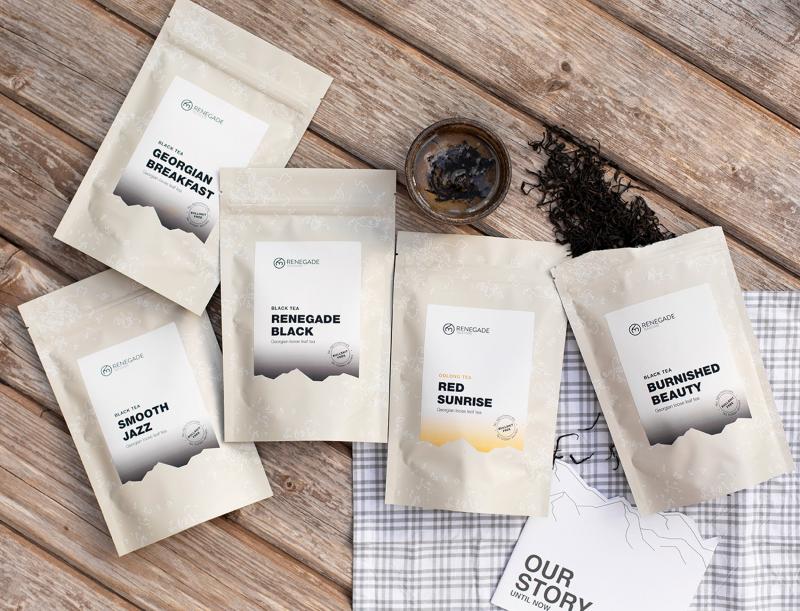Based in the country of Georgia in Eastern Europe, Renegade Tea Estate started from a dream – according to Kristiina Mehik, one of the seven owners and co-farmers. The idea, Mehik says, was to do something different – to “break free from the bureaucratic chains of the corporate world.”
Mehik says that she and her co-farmers/co-founders – Hannes Saarpuu, Tomas Kaziliunas, Hanna Villberg, Mario Kirsimaa, Miina Saak and Priit Lavits – wanted to build a business that was closer to nature and that would bring joy to themselves and to their customers. “Something that would matter,” Mehik explains.

As a result, Mehik and her friends ended up discovering Georgia and tea quite randomly. “What triggered us to start working towards our dream was reading how the once glorious tea industry had collapsed completely [in Georgia], and seeing hundreds of abandoned plantations just laying around,” she shares. “This had a huge effect on us, and we just wanted to give our part to put Georgian tea back on the map.”
Mehik notes that the other important trigger for starting Renegade Tea Estate was their belief that the tea industry, in general, is worse than many in terms of authenticity. “We were daunted by the fact that most regular tea drinkers don’t know where their tea is really coming from, and that behind those picturesque TV-ads lies a much grimmer world where tea farmers get little to nothing from the earnings that big corporations make,” Mehik explains.

Mehik says you can call the Renegade Tea Estate team “blue-eyed or overly optimistic,” but their goal was created from all of those reasons. “We do not want to be another tea company that trades anonymous mass production tea; we want to be next-door tea farmers to our customers, so they would know where and how exactly their tea was grown and produced and who are the people behind it. We also believe that we can give our part to make Georgian tea known in the world.”
World Tea News chats with Kristiina Mehik to learn more about Renegade Tea Estate, how they got their name, what it’s like running a tea farm with friends, and what they want the global tea industry to know about Georgian tea, among other topics.
Question: Hi, Kristiina. Thanks for your time. First off, how did you and your business partners decide on the name Renegade Tea?
Answer: It made sense to us because ever since we started with the project, we felt like Renegades – someone who has chosen a different path and doesn’t let the rules of a “normal life” disturb.
We feel that leaving our successful careers in our home countries, to become tea farmers in Georgia, is pretty renegade. We also think that giving a new life to plantations that have been abandoned for the last 30 years is something you don’t see every day.
In addition, we see ourselves as renegades because we want to build a different kind of tea company. We want to avoid "corporatization" and exponential growth. Our ideal is not to become the global tea behemoth, but to build the most authentic and transparent small tea estate you can find. What we produce at our estate will always be real and honest – something our team can always take responsibility for.

Question: What’s it like running a tea farm with friends?
Answer: Building a tea farm from scratch is difficult, as is building any other start-up; doing it in a foreign country adds complexity. So, building it with friends is the only way to do it. We know each other, trust each other, and can count on each other. Most of us have also worked together before, so we understand each other’s work styles and personalities, and this is a huge plus as well.
Question: Renegade Tea Estate has three tea farms. Tell us about those. What are their differences?
Answer: Our tea plantations are nested within the lower hills of the Caucasus mountains, some 75-100 kilometers inland from the Black Sea. We have three estates that are on a bird’s-eye view within 20 km radius, but they are all quite different. All our fields have slightly different climatic and soil conditions, which helps us to produce teas with different characteristics. All of them have been grown from seeds, which means that we have a mixture of different varieties of bushes, and all of them had been abandoned for nearly 30 years before we started working on them.
Renegade Estate is the biggest plantation we have, ca 17 ha, and also the first one we started working on. It is also the most secluded one. Although it is close to the main road, it is protected by chasm on all sides, so it is kind of an oasis in the middle of nowhere.
Mandikori Estate has the highest elevation (400-500m) and has the most diverse landscape within the plantation. It is also the only one where we have an area with mostly one cultivar – a locally developed one.
Rioni Estate that is located just next to our factory and is the oldest one, dating back to the 1930s. It has many forested areas and a wide range of different varieties of tea bushes.

Question: Did any of the Renegade Tea farmers have a background in tea when you launched the farm?
Answer: We did not have any tea-related background before starting on this journey. We were casual tea drinkers, nothing more. We believe though that this is an advantage for us as we look at the tea industry more as outsiders or customers and see maybe some things differently than companies with very long history.
It has also been interesting in that sense that it has been fairly easy to create our own recipes and not mimic anybody else. We didn’t have any knowledge of tea processing at the beginning, and we also can’t say that we have a very wide knowledge of teas from different parts of the world. We have experimented on our own from the very beginning – to firstly get a grip on how to make tea at all and then find out what makes Georgian tea special. It was interesting, that even though we didn’t have a wide background ourselves, if we developed a tea that felt good and interesting for us, it usually got positive feedback also from experts.
Question: What do you want the global tea industry to know about tea from Georgia, as well as tea from Renegade Tea?
Answer: Georgian tea has a centuries-long history, and just 30 years ago, it was one of the biggest tea producers in the world. But almost 100 percent of it was a very low-quality mass production tea for internal consumption within the Soviet Union. When the Soviet Union collapsed, the Georgian tea industry went down together with it. There was no market for thousands of tons of low-quality product once the borders were opened for cheap teas from other regions. And quality could not be improved overnight to compete on the higher-end segment. In five years, the production collapsed to less than 10 percent of the previous volumes. Hundreds of tea plantations were abandoned together with huge factories that were scattered around the whole of western Georgia. Villages full of people lost their livelihood and had to find new ways to make the ends meet. Thousands of plantations are still abandoned, even after almost 30 years.
Actually, Georgian teas are very aromatic and there is overall sweetness you can feel in almost all teas. This probably comes from the climate, as the harvest season lasts only five months [May to September) and there is almost six months dormancy period for bushes with quite cold winters.
Cold winters eliminate most typical pests and illnesses, making it easy to go organic. Cold winters with long dormancy also give the tea this aromatic quality.
So, despite Georgia’s image of being a Soviet mass production country, Georgia is actually a very good place to grow and produce high-quality organic tea. The combination of the soil, climate and mixture of well-aged seed-grown plants give Georgian teas a very specific and interesting flavor profile.
Question: Tell us about the tea industry in Georgia. Is it making a comeback?
Answer: Today, there are around 20 small scale farms in Georgia, most of them are located in the Guria region, closer to the sea. The majority of them focus on a few teas and selling their products to wholesalers who distribute it further. We are glad to see that among them there also more and more farms who take on the organic farming principle, and who also try to find their own niche by selling directly to customers.
Also, there are still few bigger factories around, producing lower quality tea for Russia and Central Asian countries, but in our view, Georgia is not able to compete on the mass production market, so it is only good if companies find another angle to distribute their teas which means they will be also more profitable.
There are more companies just starting up to rehabilitate their plantations and they don’t produce yet. There are still hundreds of abandoned tea plantations that could be brought back to life. We hope more and more local people will find their way back to tea and fulfil this potential.
Since Georgian tea is rather unknown in most parts of the world right now, we hope that its novelty and unique taste profile will make it exciting for more and more people to try it out.
Question: What can you tell us about the teas you make and your online shop? And are your teas sold anywhere else besides online?
Answer: Our approach is probably a bit different from most producers. We are not aiming to find one to two perfect recipes that would be our holy grails and which define the essence of Renegade Tea Estate. We are all about experimenting. Today, we have in our selection around 20 different teas – different recipes of white, green, oolong and black tea, and we keep on experimenting to find new interesting angles and new recipes.
We sometimes say that Renegade teas are like wine – each season and each month are a little different. Even each batch is a little different because our tea bushes are 60 to 70 years old seed-grown plants, which means that it is nearly impossible to gather the same kind of leaves each time to make one unified product. Also, the tea for each batch has been harvested on a certain day from a certain plantation. We never blend or hide the origins of the tea and, therefore, even teas with the same recipe have some differences in taste, dependant on which day it was made.
Our biggest selection is always at our e-shop: RenegadeTea.com. In addition, our teas can be bought from our factory shop and at Kutaisi airport. We also work with some retailers. For example, you can find our teas in France in UNAMI Maison de Thé, Palais des Thes and Tea and Ty. In the Netherlands, we work with Hotsoup, and also, in Estonia, there are quite many small shops and restaurants where you can find our teas.
Question: What is the Renegade Community Garden?
Answer: Renegade Community Garden connects 169 people from 21 different countries around the world who have a personal tea garden in one of our plantations – Rioni Estate. The owners of the small tea gardens are a part of the Renegade story and the history of reviving the abandoned Georgian tea plantations together with us.
The first 80 tea gardens were adopted in 2018 via our Indiegogo crowdfunding campaign. The gardens were adopted by people who really believed in us and wanted to support Renegade Tea Estate's story even before we had made a single batch of tea!
After that we have had so much interest for the personal tea gardens, so we have allocated each year a few more gardens to invite more people to the Renegade community.
Question: Renegade Tea also created a separate tea garden for personal tea bushes at your Mandikori Estate. What’s the idea behind that?
Answer: The first tea bush owners joined us in 2018, also via our Indiegogo crowdfunding campaign. These were people who believed in us and wanted to support Renegade Tea Estate's story even before we had made a single batch of tea. Today, a tea bush is a product on our homepage which anybody can buy for themselves or gift to a friend or family member. Today, our personal tea bush garden connects 95 people from different parts of the world.
Question: What are some of the challenges Renegade Tea has faced during the COVID-19 pandemic?
Answer: The pandemic was interesting for us. Myself and Hannes were planning to visit Georgia for just 10 days, a quick visit before the season starts. Instead, Europe went to lockdown and we had to stay there for five months without the rest of our team. So, instead of seven people, it was just the two of us for most of the season.
It was challenging. We were in lockdown when the season started, so the bushes were growing, but we couldn't get to the fields to harvest them. When the lockdown ended, we managed to start with the works, but then a curfew was implanted. The curfew started at 9 p.m., which meant that the whole production had to be planned by the minute so we would get home by nine.
While it was stressful at first, we realized at some point that there was nothing we could do about it, and we can’t do the work of seven people. But, we can give our best to get through the season nevertheless. Somehow, we managed to harvest, produce and package everything that was planned. The tea bushes perhaps didn't get as much attention that we would have liked to give, so the plantation suffered a little bit, but all in all, we managed to make it through the season. It is definitely a season we will remember.

Question: Wow, what a story. So how has Renegade Tea Estate been successful, overall?
Answer: We believe we have been successful so far because as complete rookies in the tea world and agronomics, we have made it to the end of our fourth season. We have managed to bring three plantations back to life, we have built a trustworthy community who believes in what we do, and we do believe we have also made a huge leap with our teas and can be proud about them.
Question: How do you promote the Renegade Tea brand?
Answer: We promote our brand mainly via word-of-mouth marketing. We believe that our teas and the way we do things are something that people want to share with other as well. So far, it has proven to be true.
Question: How would you describe the global tea market right now?
Answer: We believe the global tea market today is very much dominated by big players and, unfortunately, the customers often don’t know where their tea is really coming from and how it has been grown and produced. The fact that tea is mostly commoditized and supply chain controlled by big corporations means that also very little income from the tea sales gets to the actual farmers and producers. We hope that the tea industry will get more transparent and that the people behind the tea would get the earned reward.
Part of the problem is also on the market side. When people don’t know about the product, they can also not make educated choices. It’s a fact that an average tea drinker knows rather little about tea – just take ourselves as an example from a few years back. Most people who visit our farm are surprised that both green and black tea can be made from same leaf. Most have never tried oolong.
Question: Thanks so much for your time. Last question: Do you have wholesale opportunities for retailers?
Answer: We do also sell to retailers in small scale, but it is limited by two factors – the quantities we produce and how willing the retailer is to tell the story of Georgian tea. We are strongly against selling teas anonymously, and this is the main factor for us when choosing wholesale partners. If anybody is interested to sell our teas, then they can write to us to [email protected] and we will for sure discuss the possibilities.
To learn more about Renegade Tea Estate, visit RenegadeTea.com.
